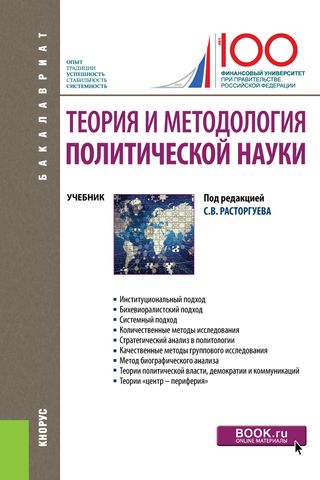?
Глава 3. Бихевиоралистский подход
С. 41–53.
Fomin I., , in: Discourse Linguistics and BeyondVol. 2: Current approaches in Eastern Europe.: Berlin: Sprachlit ; De-iure-pl, 2018. P. 45–52.
In this article, I propose to consider semiotics as one of the fundamental transdisciplinary methodologies of social sciences and to explore how it functions in this role in the political discourse analysis and in the political research in general. The aim of this article is to outline the structure of the semiotic toolkit in political studies, to ...
Added: May 23, 2020
Pomiguev I., М.: КноРус, 2019.
Designed to study the basic theoretical and methodological approaches, research methods and a number of political concepts of modern political science.
The main goal is to provide students with the opportunity to conduct independent scientific research using theoretical and methodological approaches and methods of political science.
Corresponds to FGOS VO of the last generation. For bachelors-political scientists, students ...
Added: February 6, 2020
Gaman-Golutvina O. V., Аспект Пресс, 2019.
Издание содержит описание более чем 30 методологических подходов и парадигм, сложившихся в мировой политической науке. Каждая глава книги - самостоятельный и особый взгляд на политический мир, политические процессы и явления сквозь призму тех или иных взаимосвязанных методологических принципов и теорий.
Коллектив ведущих отечественных политологов из академических научно-исследовательских институтов, университетов, Российской ассоциации политической науки представляет анализ широкого ...
Added: August 24, 2019
Poretskova A., Политическая наука 2018 № 1 С. 269–282
Article tries to shed light upon the political theory functional contradiction
through the dichotomy of humanistic and post-structuralist tradition. In the nutshell,
there is a question about the status and the process of legitimization of the scientific
knowledge and its corresponding consequences. Several sections of the articles are
dedicated to external and internal aspects of the methodological reflection within ...
Added: August 27, 2018
Алексеева Т. А., Байков А. А., Барановский В. Г. et al., М.: Аспект Пресс, 2017.
Учебник содержит описание и исследование более чем 30 методологий, методологических подходов и методологических парадигм, сложившихся в рамках мировой политической науки. Каждая глава учебника — самостоятельный и особый взгляд на мир политического, на политические процессы и явления сквозь призму тех или иных взаимосвязанных методологических принципов и теорий. Политика многогранна, и объяснение политики, изучение политических явлений может ...
Added: June 30, 2018
Fomin I., Политическая наука 2015 № 2
Для современного социально-гуманитарного знания, и для политологии в частности, характерна отчетливая тенденция к дисциплинарному и субдисциплинарному дроблению. Однако можно выделить ряд общих познавательных способностей (органонов-интеграторов), которые реализуются в отдельных дисциплинах, но при этом дисциплинарными барьерами не ограничиваются. И семиотика представляет такие возможности. ...
Added: September 23, 2017
Turchenko M., Zavadskaya M., Полис. Политические исследования 2017 № 2 С. 134–146
This article speaks to methodological aspects of the ways to use a popular research technique – process tracing. The latter has gained momentum as a compromise between neo-positivist and interpretative approaches. Authors provide a brief overview of the method’s role in current political research; carefully describe the peculiarities of method’s procedure; compare process tracing with ...
Added: March 28, 2017
Fomin I., Ilyin M., Политическая наука 2016 № 3 С. 12–29
Today in political science we are used to distinguish between methods that are qualitative and quantitative. And while the quantitative techniques are based on the apparatus of mathematics, the qualitative ones don’t seem to have any basic methodological framework of this kind. It is suggested to consider semiotics in this role of the «mathematics» of ...
Added: March 14, 2017
Lokshin I., Политическая наука 2015 № 2 С. 80–103
The paper applies the Duhem-Quine thesis to conventional quantitative methods in political science. As a result, the discussion of methodological problems associated with these methods is implanted into the epistemological issues highlighted by the Duhem-Quine thesis. Special attention is devoted to the widespread research practices, such as 1) null hypothesis significance testing, 2) large-N analysis ...
Added: October 15, 2015
Lokshin I., МЕТОД: Московский ежегодник трудов из обществоведческих дисциплин 2014 Т. 4 С. 403–425
Статья представляет собой обзор четырех, возможно, наиболее важных книг по методологии политической науки, вышедших в последние 20 лет: "Designing Social Inquiry" Г. Кинга, Р. Кеохэйна и С. Вербы; "Redesigning Social Inquiry: Fuzzy Sets and Beyond" Ч. Рэгина; "Rethinking Social Inquiry: Diverse Tools, Shared Methods" под ред. Г. Брейди и Д. Колье и "Social Science Methodology: ...
Added: July 18, 2015
Патцельт В., Политическая наука 2012 № 3 С. 50–70
В статье дается обзор формирующегося подхода к изучению политических институтов - эволюционной морфологии. Разъясняются теоретические предпосылки этого подхода, его отличия от других подходов и преимущества перед ними. ...
Added: July 18, 2015
Моргун О. М., Политическая лингвистика 2011 № 3 С. 122–128
This article examines critical discourse analysis usage for political investigations. Special survey of literature, schedules and articles brings out strong methodological deficiency. Some argumentation on issues, means and limits of critical discourse analysis emphasize its prospects for political science development. ...
Added: November 21, 2012
